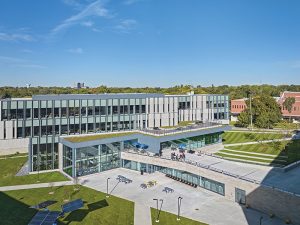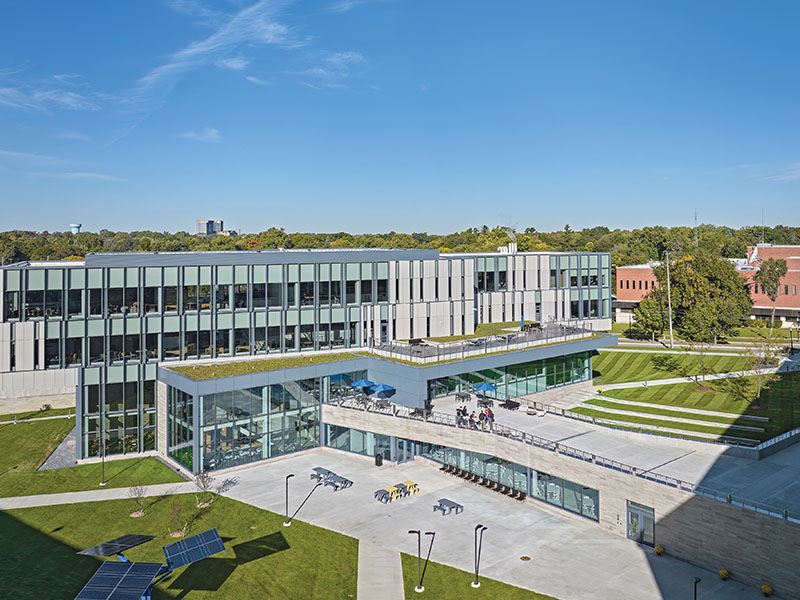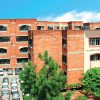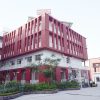No products in the cart.
Kettering University, USA
Summiya Yasmeen
Internationally renowned for its unique ‘co-op education’ programme, Kettering’s curriculum blends rigorous academics with paid employment in the university’s 570 industry partners

Kettering’s Learning Commons: national and international acclaim
Founded in 1919 as a school for automotive engineers and technicians in the automobile hub of Flint, Michigan, Kettering University has evolved into a fully-fledged premier STEM and business management education university, internationally renowned for its unique ‘co-op education’ programme. Unlike traditional universities, Kettering’s curriculum blends rigorous academics with paid employment in the university’s over 570 industry partners. On average, Kettering students earn up to $55,000-75,000 (Rs.47-65 lakh) during a 4.5-year programme alternating 11-week terms in the classroom with closely mentored 11-week terms in workplaces. Kettering is the sole American university where every student spends half his/her degree programme in the workplace.
Unsurprisingly, Kettering’s pioneer ‘50/50 classroom/workplace co-op program’ has won it national and international acclaim. In the inaugural EducationWorld-Launchpad (undergraduate focus) America’s Best Universities Rankings 2025, Kettering is top-ranked in the highest Diamond category. Similarly in its America’s Best Colleges Rankings 2025, U.S. News & World Report ranks Kettering among Top 20 US universities for undergrad engineering education and in the co-ops/internships category. The Wall Street Journal ranks it among the Top 10 in the US for career preparation.
Kettering’s co-op programme also makes Kettering graduates highly employable. According to WSJ, 97 percent of Kettering students are employed within a year after graduation with many of them immediately fast-tracked into leadership positions with the highest starting pay packages in Michigan.
Founded in 1919 as the School of Automotive Trades by a consortium of automobile manufacturers to train workers for the fast-expanding automotives industry, the school was purchased by automobiles behemoth General Motors in 1926 and renamed the General Motors Institute. In 1982, it was spun off as a private university and named Kettering University in 1997 to commemorate Charles F. Kettering, inventor, engineer and head of research at General Motors (1920-1947).
Currently, Kettering offers nine Bachelor’s, 17 Master’s, several certificate and online programmes to 1,500 students mentored by 100 faculty. Kettering alumni have served as CEOs/Presidents at General Motors; Yamaha Motor Corporation; Reuters; Merrill-Lynch; Continental Airlines among other top corporates.
“Kettering University is a unique higher education institution because we were founded to produce measurable outcomes and graduates prepared to lead in the most demanding technical and professional arenas. Our unique academic model — the only one in which all students spend 50 percent of their time in rigorous classroom instruction and 50 percent in immersive, industry-embedded cooperative education — was designed to ensure that students achieve mastery in their disciplines, not just knowledge. We continue to innovate to graduate students who are among the best prepared for the 21st century economy,” says Dr. Robert McMahan, an alum of Dartmouth College and Duke University and President of Kettering University since 2011.
Flint. Seventy minutes by road from Detroit, from 1908 until the 1920s, Flint hosted the headquarters of General Motors (annual revenue: $188.44 billion), for decades the world’s largest and most respected mega corporation. GM was founded in Flint in 1908, and the city was an automobile manufacturing powerhouse until the early 1980s. Though GM has significantly downsized its operations in Flint, the city remains an automobiles powerhouse, hosting GM’s oldest operational automobiles facility.
Sited on the Flint River bank, the city is now reinventing itself as a center of education, innovation, and the arts. Together, the University of Michigan-Flint, Kettering, and Mott Community College host over 16,000 students. The city’s vibrant cultural scene includes the Flint Institute of Arts, Flint Institute of Music, Flint Repertory Theatre, Flint Symphony Orchestra, and Sloan Museum & Longway Planetarium. A wide range of restaurants and attractive retail stores and malls line the city’s main thoroughfare with an expansive Farmers’ Market nearby. Local parks, nature trails, and the Flint River Trail offer students a plethora of opportunities for biking and hiking, kayaking, boating, and fishing. Typical of Great Lakes states, Flint endures cold winters (-5°-2°C) with moderate snowfall and warm and seasonable summers (24°-29°C). Autumns are colourful during the Fall foliage season and the lakes attract boaters, hikers and fishermen in droves.
Campus facilities. Sited on a scenic 90-acre campus along the Flint River west of downtown, the Kettering campus blends vintage architecture with modern academic buildings and specialised state-of-the-art laboratories. Campus landmarks are the 400,000 sq. ft Academic Building hosting fully-wired classrooms, science and computer labs; the McKinnon Theatre; the Campus Center hosting the university’s administrative offices; C.S. Mott Engineering and Science Center housing advanced labs for crash safety, autonomous vehicles, renewable energy systems and competition vehicle team garages; Innovation Center for start-ups and the GM Mobility Research Center which offers a unique on-campus test track and proving ground for autonomous vehicles and mobility technologies. The Learning Commons — a 105,000 sq. ft hub — serves as the heart of campus, featuring study areas, an auditorium, a makerspace, rooftop terrace, the digital library collection, and dining spaces. The library and digital collection features over 1 million print volumes and ebooks, 100,000 journals/ejournals and 125 databases.
Sports facilities are provided by the Connie and Jim John Recreation Center, a 70,000 sq. ft indoor complex featuring a swimming pool, indoor tracks and field facilities, gymnasiums, squash and racquetball courts. Outdoor fields and the historic Atwood Stadium support team sports and community events.
Kettering students also benefit from a vibrant campus life with more than 40 clubs and student organisations, including engineering design teams, robotics, performing arts, and cultural groups, organising events through the year.
Admission. The minimum eligibility criteria for admission are completion of class XII/Plus Two and English language proficiency (minimum TOEFL score of 79; IELTS 6.0). Applicant students also need to prove that they have studied two years of algebra, one year of geometry, one semester of trigonometry and two years of physics/chemistry lab science in high school. “The university does not have a fixed formula for admission but seeks students who exhibit strong records of achievement, with SAT and ACT scores being optional,” says a Kettering spokesperson. There is no admission application fee and the university follows a rolling admissions policy for terms beginning July or October.
For graduate admission, students are required to submit a Statement of Purpose, undergraduate exam transcripts, two letters of recommendation and a composite GRE score of at least 300 (verbal and quantitative reasoning) together with an analytical writing score of 3.0.
For further information, email admissions@kettering.edu; website: www.kettering.edu.
Accommodation. The on-campus Frances Willson Thompson Hall provides housing for all first-year students. Spread over four floors, it offers single bedrooms, common lounges, study areas, community kitchens, and internet/AC access. Third and fourth-year students enrolled in co-op programmes usually reside in private rented accommodation.
Degree programmes. Kettering offers nine undergraduate degree programmes, 16 minors, and 17 Master’s degree programmes (see p.37).
SCHOLASTIC OPTIONS AT KETTERING
Kettering University offers a wide range of undergrad and postgraduate programmes in STEM and management disciplines. They include:
Undergraduate. Bachelor of Science degree programmes in chemical engineering, computer engineering, computer science, electrical engineering, engineering (with specializations in engineering management, manufacturing systems, mechatronics and robotic systems), industrial engineering, management, mechanical engineering, and a new accelerated semiconductor materials and devices program designed to be completed in three years.
Postgraduate. Computer engineering, electrical engineering, electrical & computer engineering — advanced mobility*, mechanical engineering, mobility systems, artificial intelligence, autonomous vehicles, electric vehicles, applied data science and data analytics, engineering management*, lean manufacturing*, operations management*, lean systems*, supply chain management*, MBA*, Tech MBA (*Online programs option)
Graduate certificates. Short-term on-campus certificate programmes in electric vehicles, foundations of data science, global leadership, lean principles for healthcare, management and leadership, operations management, supply chain management.
Bill of costs* (per year)
Tuition $50,650
Housing $6,000
Food $4,750
Total $61,400
*Undergraduate $=Rs.87
Post Views: 154
















Add comment